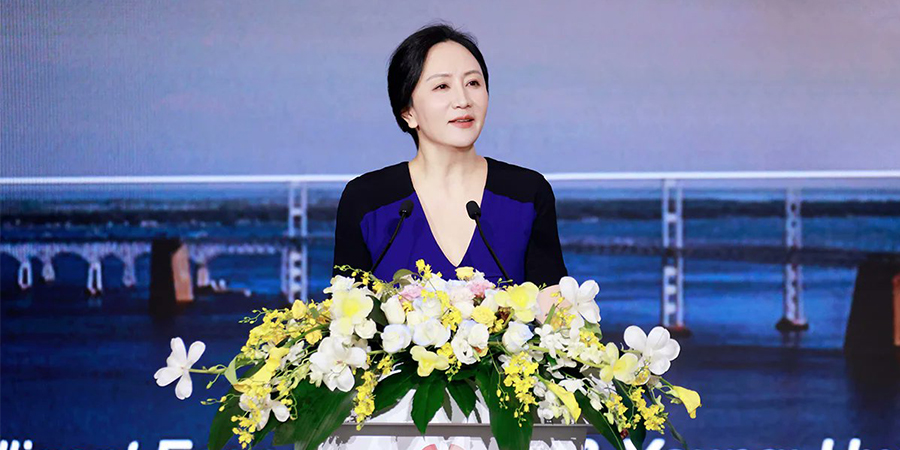Huawei’s 20th annual Global Analyst Summit (HAS) under the theme “Thrive With Digital, Striding Towards the Intelligent World” saw attendance by over 1,000 industry analysts, financial analysts, key opinion leaders and media representatives from around the world.
The two-day summit discussed the status of the ICT industry, including development strategies, roadmaps for digital transformation and future industry trends.
Sabrina Meng, Huawei's deputy chairwoman, rotating chairperson and CFO, opened with a keynote. "Digitalization is a blue ocean for the whole industry," she stated. "Huawei will keep investing in domains like connectivity, computing, storage and cloud."
"We aim to provide our customers with digital infrastructure that has the simplest possible architecture with the highest possible quality — that delivers the best possible experience at the lowest possible costs. Our goal is to help organizations go digital in four stages: digitizing operations, building digital platforms, enabling platform-based intelligence, and putting intelligence to use. The time is ripe to thrive together in this new and exciting digital future."
Meng went on to share three major takeaways from Huawei's nearly 10 years of digital transformation experience. "First, strategy is essential. At its essence, digital transformation is about strategic planning and strategic choices. Any successful digital transformation has to be driven by strategy, not technology."
"Second, data is the foundation," she continued. "Data only creates value when it flows across an organization, so methodical data governance is key. Integrating data across different dimensions will create even greater value."
"Third, intelligence is the destination. Data is redefining productivity. Digitizing operations and building digital platforms helps clean, visualize and aggregate data, laying the foundation for digital transformation. Putting intelligence to use makes data on-demand, easier to understand and actionable, taking digital transformation to the next level."
Meanwhile, Dr. Zhou Hong, president of Huawei's Institute of Strategic Research, also spoke at the event. He shared Huawei's hypotheses and visions for a future intelligent world, detailing how we can transform experience into structured knowledge and lay the foundation for intelligence.
"Rethinking approaches to networks and computing is critical as we move towards an intelligent world," said Zhou. "In networking, we have what it takes to move beyond the limits of Shannon's theorems — as well as applications of his theory — to drive a 100-fold increase in network capabilities over the next decade. In computing, we will move towards new models, architectures and components and improve our ability to both understand and control intelligence. We will also continue to explore the use of AI for industry applications, science and more."
The two keynotes were followed by a panel discussion on the role that digital productivity plays in driving industry digitalization, the challenges industries face in their digitalization processes, recommended actions and expectations for industries in the process of building up their digital productivity. The panelists included Li Peng, chief expert of China Southern Power Grid Corporation and managing director of its Digital Power Grid Group; Liang Yongji, executive director of Engineering & Technology at the Airport Authority Hong Kong; Liu Hong, head of technology at GSMA in Greater China; and Charles Ross, principal of Technology and Society at Economist Impact.
Also Read: Huawei Sees Annual Profit Slump Amid Heavy R&D Investment
On the second day of the summit, Peng Song, Huawei's president of ICT Strategy & Marketing, delivered the keynote speech titled “Striding Towards the Intelligent World Through Continuous Innovation.”
In his speech, Peng stressed that the digital economy is becoming a main driver of global economic growth and that digital technologies are being applied in diverse production scenarios across a wide range of industries. This makes data a new factor of production and is driving significant leaps in social productivity. Peng said that as digital infrastructure is critical for the success of the digital economy, Huawei is committed to collaboratively developing transmission, computing and storage power to improve the efficiency of data collection, transmission, computing, storage and analysis in order to improve digital productivity and boost the digital economy. Peng also talked about how Huawei is working to build leading digital infrastructure, including leading transmission facilities supported by the more advanced 5.5G, F5.5G and Net5.5G technologies to support IoT services, computing infrastructure and reliable storage facilities to ensure more data can be stored, quickly transmitted and efficiently used.
Other industry experts also shared their experience in this area.
Wang Zhiqin, vice president of the China Academy of Information and Communications Technology (CAICT), introduced the ICT industry's top 10 trends for 2023. She said, "The digital economy is entering a phase of quality growth driven by data. The digital governance and security systems have been basically established. High-quality ICT development will propel healthy and prosperous development of the digital economy."
Sun Zhengyun, vice president and secretary-general of the China Energy Research Society, talked about how power grid enterprises can go digital to support China's carbon peak and carbon neutrality strategies.
Li Fuchang, director of the Wireless Technology Research Center of the China Unicom Research Institute, shared updates on China Unicom's recent research and exploration into 5.5G. Li shared a range of applications of cutting-edge technologies such as 5.5G integrated communications and sensing, URLLC and RedCap, and he proposed the future development directions of 5.5G.
Feng Dan, Changjiang distinguished professor and dean of the School of Computer Science and Technology at Huazhong University of Science and Technology, talked about the development trends of diskless data center architecture and near-data processing. She said, "Technologies such as high-performance heterogeneous computing, high-speed networking, large-capacity new disk enclosures and near-data processing are accelerating the evolution of data centers from a CPU-centric coupled architecture to a diskless architecture featuring decoupled storage and compute, and resource pooling and sharing. In the future, large-capacity new disk enclosures will become the new foundation for data storage."
Also Read: Two French Telcos Seek Compensation for Replacing Huawei Kit











